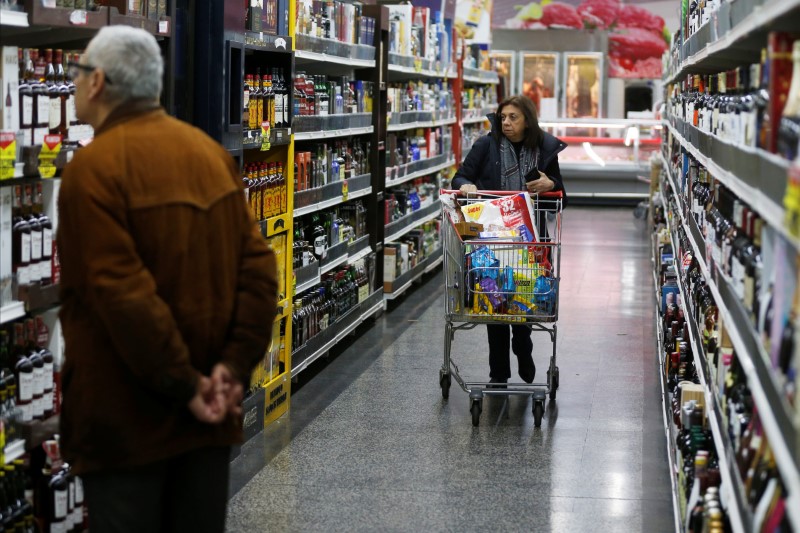By Tom Arnold and Imad Creidi
BEIRUT (Reuters) - Lebanese consumers feeling the pinch from rising living costs amid an economic crisis are likely to be squeezed even tighter as more local pounds and less U.S. dollars come into circulation, pushing up inflation.
Lebanon has long relied on a steady flow of dollars from its overseas diaspora to help fund its financial system. But that has been choked off as faith in the political elite crumbled.
People have been hit by what economists estimate is a 30% annual rise in inflation during the crisis that escalated in October. The pound has collapsed against the U.S. dollar in the parallel market and a liquidity crunch has bitten.
That slashed consumer purchasing power and prompted some to withdraw pounds from banks as unofficial capital controls shattered confidence in the banking system and restricted access to dollars.
Arlette Mattar, 54, a midwife and mother of three, has cut back to basics, eliminating sweets and restricting purchases of items like tissues and toiletries.
"The cost of living is high now," she said outside a supermarket in a middle-class Beirut neighborhood. "Now when I shop I get only what I need."
While the pound, pegged against the dollar for 22 years, is the official currency, the greenback has long been used as an alternative for transactions. Some consumers who were buying with dollars say they now use pounds.
"Today you know the most important thing is food, it is necessary for one to live, so this affected all Lebanese families," said a beautician and mother of two who asked only to be identified by her surname, Boutros.
She had tightened spending on goods like cleaning products.
The Lebanese economy relies on imports.
Hani Bohsali, president of the Syndicate of Importers of Foodstuffs, Consumer Products and Drinks, estimates the costs its members pay overseas suppliers have risen around 40% since October mainly because of the exchange rate depreciation.
Higher costs have been passed on to retailers.
"It's dreadful," Bohsali said. "There are no trade facilities with banks anymore, so liquidity is tight. What is in your pocket today is what you have, so it's hard for us to do business."
Lebanon on Tuesday finally formed a government under Prime Minister Hassan Diab after three months of political paralysis and street protests, but it still must resolve the crisis and win over investors and foreign donors.
While it is not in the grip of the hyperinflation besetting Venezuela and a decade ago in Zimbabwe, economists warn that Lebanon risks sliding closer towards that plight without a resolution to the crisis.
This week the central bank announced newly printed 50,000 pound notes would enter circulation. M1, encompassing currency in circulation and demand deposits in pounds, swelled 45% at the start of January from a year earlier.
Flooding the market with pounds while rationing dollars, risks exacerbating inflation and widening the pound's depreciation in the parallel market, said Nafez Zouk at Oxford Economics.

"Net-net there'll be more inflation," he said. "Let's assume that 50% goes under the mattress and 50% goes into circulation that will still weaken the exchange rate and that's still inflationary."